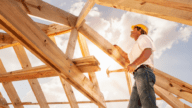Here’s the Average Cost to Build a House in Beautiful Michigan
- Published on
- 10 min read
-
 Summer Rylander, Contributing AuthorClose
Summer Rylander, Contributing AuthorClose Summer Rylander Contributing Author
Summer Rylander Contributing AuthorSummer Rylander is a freelance writer and editor with an abundant background in real estate. A former residential real estate agent in the Columbia, SC area and sales administrator at a commercial real estate firm, she now uses this experience to help guide readers. Summer currently resides in Nuremberg, Germany, where she fulfills her passions of food and travel and avoids her dislikes of mayonnaise and being trapped in an office.
-
 Joseph Gordon, EditorClose
Joseph Gordon, EditorClose Joseph Gordon Editor
Joseph Gordon EditorJoseph Gordon is an Editor with HomeLight. He has several years of experience reporting on the commercial real estate and insurance industries.
For buyers in Michigan who can’t seem to find the right home, building is certainly one path to homeownership. As the hot seller’s market has cooled, top HomeLight agents agree that inventory is rising.
But, according to Bethany Brokaw — a real estate agent selling homes in Genesee County for 13 years — the average cost to build a house in Michigan “would be deemed quite expensive right now, especially compared to three years ago.”
Brokaw says that, on the low end, buyers can expect to pay $150 per square foot to build a house, “and I’m talking no basement, very small lot, and builder-grade finishes,” she explains.
“And your higher end can be anywhere between $300 to $700 per square foot, depending on your location, if you have a water view, how large your lot is, and which finishes you choose.”
On average, though, to build a home in Michigan with desirable finishes like granite countertops, hardwood floors, and other basic upgrades, “buyers are definitely looking at around $250 per square foot,” says Brokaw.
To build a 1,500-square-foot home, this clocks out for $375,000. Meanwhile, the median price per square foot of existing homes in Genesee County is just $135 per square foot — or $202,500 for 1,500 square feet.
When it comes to purchasing a home, there are plenty of reasons buyers might have their eye on a new construction property rather than an existing one.
There’s an undeniable appeal to being the first to live in a brand-new home. If you’re buying early enough to be involved in the building process, you can often make decisions about paint colors and upgrading materials to customize your home before moving in.
Of course, the cost of buying real estate is rarely so cut and dry. It very well may be cheaper to buy a house than to build one, but it depends on everything from location to your personal preferences for fit and finish.
Here is an at-a-glance look at the average costs of each phase of building in Michigan, but we will break it all down next:
| Building Phase | Average cost (2025) |
| Foundation | $9,383 |
| Framing | $1,409 – $7,666 |
| Roof | $5,866 – $13,208 |
| Siding | $5,562 – $17,623 |
| Appliances | $2,100 – $5,400 |
| HVAC System | $10,000 |
| Plumbing System | $2,280 – $5,120 |
| Electrical System | $602 – $2,594 |
| Building Permits | $525 – $3,041 |
| Finishes and Fixtures | $30,181 to $321,021 |
Cost to build a house in Michigan in 2025
No matter which state you’re in, the steps involved in building a house will vary depending on whether you’re buying a tract home — which is when a builder has bought a large tract of land to divide into lots and build out several homes — or if you’re building a custom home.
Keep in mind that the price ranges we’re providing are general estimates. Your agent and, eventually, your builder can give you more specific pricing information.
Buying a plot of land ($6,310 per acre)
The USDA’s land values report for 2024 — which evaluates farmland real estate values — indicates that Michigan’s average value per acre was $6,310 in 2024, which is a 7.3% increase over 2023’s land value of $5,880 per acre.
Now, if you’re looking to build a single family home in the suburbs, the price of farmland probably doesn’t seem relevant. But, these numbers do provide a baseline for managing expectations, and working with an experienced real estate agent will help you fill in more specific pricing gaps based on your specific location and lot size needs.
Foundation ($4,039 – $14,848)
Foundation costs will vary depending on whether you’re pouring a slab or digging a basement, but a typical price range is between $4,039 and $14,848.
Framing ($1,409 – $7,666)
Framing is when the sticks go up, and a structure actually starts to take shape. Expect to pay between $1,409 and $7,666 for this phase of building a house in Michigan. Framing costs tend to vary due to both the size of the home and the complexity of its design — a one-story home with 2,000 square feet of living space will generally be less expensive to frame than a two-story home with the same square footage.
Roof ($5,866 – $13,208)
Roofing doesn’t come cheap — whether putting one on a new house or replacing the roof on an existing home. The costs of a new roof typically range from $5,866 to $13,208. Asphalt shingles are the most affordable roofing option, at around $3-$7 per square foot, with tile roofing being more expensive, costing around $10-$20 per square foot.
Siding ($5,562 – $17,623)
Siding is another big variable: Are we talking vinyl, wood, brick, concrete, stone, stucco, or something else entirely? Siding costs range between $5,562 and $17,623, with vinyl or engineered wood siding typically costing between $3 and $12 per square foot.
Appliances ($2,100 – $5,400)
Appliance pricing also varies widely. Depending on brand, functionality, finish, and so on, you’ll spend anywhere from $2,100 to $5,400 if the home does not come with any, but you can drop up to $24,400 or more on high-end appliances.
HVAC system ($10,000)
The installation of a new heating and cooling system could cost upwards of $10,000, depending on the size of your home.
Plumbing system ($2,280 – $5,120)
Plumbing can cost anywhere from $2,280 to $5,120 on average — not including fixtures like sinks and toilets.
Electrical system ($602 – $2,594)
The cost to wire a house is, on average, between $602 to $2,594.
Building permits (Variable)
Permits vary by state, city, and county, but they typically range from a few hundred dollars to a few thousand. In Michigan, permit costs to build single-family homes are based on the project’s calculated “total construction cost.”
Finishes and fixtures ($30,181 to $321,021)
Finishes and fixtures comprise everything from countertops to sinks and lighting to flooring. Pricing varies widely and depends heavily on your preferences.
Average carpet installation costs can start at several hundred dollars and go up to $3,000, while hardwood flooring installation starts at around $2,500 up to $7,000.
Laminate countertops range from $841 to $1,738, while granite averages from $2,000 to $6,000.
Depending on the size of your home and the quality of finishes, this can be a large portion of the cost of building a house in Michigan.
Additional costs of building a custom house in Michigan
Building a custom home usually comes with additional costs. Again, your agent can help you determine more accurate costs — these are average figures provided to give you an idea.
Hiring an architect ($18,750 – $75,000)
Architect fees fall between 8% to 15% of the total project cost, according to HomeAdvisor. So, for the 1,500-square-foot home with a build cost of $375,000, that could mean anywhere from $30,000 to $56,250.
Land survey ($376 – $768)
Land surveys, which identify your property lines and land features, range between $376 and $768.
Excavation and grading ($20,000 – $50,000)
If you’re buying a tract home, the land price will be rolled into the overall price to build a home. If you’re buying a lot on your own and then building a custom home, Brokaw says you can expect to pay between $20,000 and $50,000 to clear the land, run utilities, and put in a driveway.
More affordable options for building a home in Michigan
While going with a bare-bones building strategy can get you into a new construction home for less, cheaper isn’t always better. Shoddy build quality will inevitably lead to problems down the road — anything from a leaky roof to poor sound insulation can be a frustrating discovery when you’ve only been in your new home for a few months — and there’s value in creating a home you genuinely want, not just one you’re settling for.
Alternative home-building options can give you more for your money and offer valuable flexibility during the construction process.
Tiny homes ($30,000 – $60,000)
A tiny house is usually 600 square feet or less in size. They’re not ideal for large families, but building a tiny house can be faster and more affordable than a conventional home if a smaller space fits with your lifestyle. They can also be a great starter home option, especially as construction of starter homes (homes smaller than 1,400 square feet) has declined in Michigan. On average, tiny homes cost between $30,000 and $60,000 to build.
In Genesee County, Brokaw says tiny homes aren’t especially popular, but they’re increasingly on people’s radar.
“We have a national builder who just came into this area, and they would have, by far, the lowest cost houses,” says Brokaw. “But every single one of their houses has the exact same finishes inside — you can’t even pick your paint color, even if you’re willing to pay extra. Their prices are roughly $140 per square foot.”
Modular and prefabricated homes ($180,000 – $360,000)
In Brokaw’s market, modular homes are not common — largely because deed restrictions and HOA regulations in the area call for site-built homes. That said, in general, modular homebuilding tends to cost between $180,000 and $360,000.
Cost comparison: Building a house in Michigan vs other states
When considering building a home, location plays a significant role in determining costs. In Michigan, the average cost to build a home ranges between $150 and $300 per square foot, largely due to Michigan’s relatively low land prices, favorable labor market, and access to locally sourced building materials.
In contrast, states like California, with its higher labor costs and stricter building regulations, often see construction costs starting at $200 and reaching up to $600 per square foot. Similarly, in states like New York or Washington, the combination of limited land availability and increased demand for skilled labor pushes the average cost per square foot well above Michigan’s range.
The Midwest, in general, tends to offer more affordable building options compared to the West Coast or Northeast. For example, Ohio and Indiana have costs that are comparable to Michigan, typically ranging from $120 to $200 per square foot, while Southern states like Texas often fall on the lower end due to cheaper land and labor.
It’s a huge sum, but it’s worth it to build a home in Michigan
Brokaw warns that between labor shortages and supply chain delays, building a new home in Genesee County right now can take seven to nine months for a tract home, or nine months up to two years for a custom-built home.
However, she believes it’s still worth the time and money if you’re interested in building a new home.
“It’s still a great thing for people to do. There’s peace of mind in knowing that every single thing in the house is new — it’s a wonderful thing,” Brokaw says. “It’s just something you need to be prepared for and think through, especially if you’re doing a custom product.”
Brokaw encourages buyers to work closely with an agent who has experience with new construction homes and the homebuilding process.
“Ask how many new construction transactions they have; ask if they have personal experience with new construction,” urges Brokaw. “Ask if they’re familiar with the builders in the area and the different neighborhoods — different builders have different levels of quality.”
Finally, Brokaw wants buyers to remember that a project like this requires patience, understanding, and flexibility — both with price and timing.
“The timeframe you were quoted will probably not stick,” she cautions, “and you need to be prepared that your quoted price point could also change if the builder runs into problems, or if you decide you want to change or upgrade something along the way.”
Header Image Source: (Shopify Partners / Burst)
- "Land Values 2024 Summary," United States Department of Agriculture (August 2024)
- "How Much Does a Foundation or Basement Cost in 2024?," HomeAdvisor (November 2024)
- "How Much Does It Cost to Frame a House in 2024?," HomeAdvisor (August 2024)
- "How Much Does Roof Replacement Cost in 2025?," HomeAdvisor (December 2024)
- "Cost of Laminate Countertops in 2024: Detailed Breakdown," HomeAdvisor (August 2024)
- "How Much Does It Cost to Hire an Architect in 2025?," HomeAdvisor (December 2024)
- "7 Tiny Home Floor Plans with Big Potential," America's Best House Plans (May 2023)






